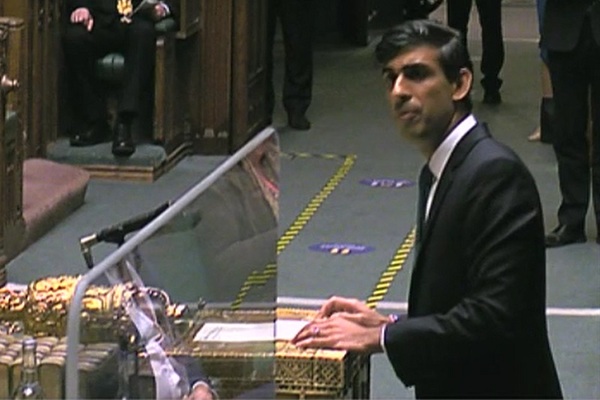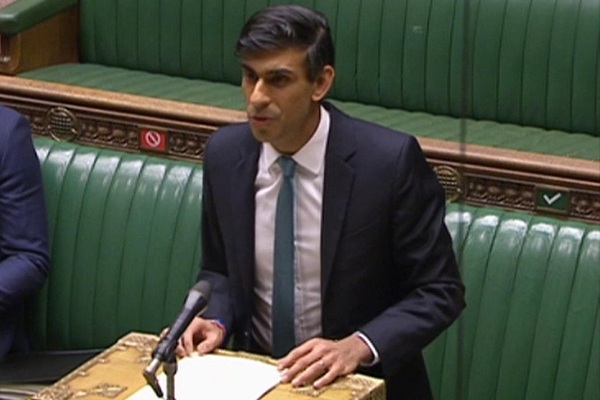You are viewing 1 of your 1 free articles

Jules Birch is an award-winning blogger who writes exclusive articles for Inside Housing
If the government really wanted to help ‘generation rent’, it would not be acting to inflate house prices
The chancellor’s measures are aimed at averting a house price crash, which the taxpayer will be placed on the hook for as a result of his latest measure. But more fundamental change is required, writes Jules Birch
There was a brief moment in chancellor Rishi Sunak’s Budget speech this week when my ears pricked up. It was when he mentioned the ‘housing sector’ and how many jobs it supported.
This could be the time, I thought, when he will announce more investment in new affordable homes and a new scheme to decarbonise existing social homes. Just the sort of projects that will deliver jobs quickly after the pandemic.
Perhaps the government at Westminster could even be about to follow the example of the Welsh government in its Budget yesterday and increase Social Housing Grant to almost four times the level it was five years ago? Or even announce more help for tenants.
Wrong. It turns out the ‘housing sector’ he had in mind consists of house builders, estate agents and their shareholders.
This was a Budget that had nothing to say about social housing, saw Local Housing Allowance (LHA) rates frozen again and ominous signals in the small print of spending cuts to come.
Officially, LHA will be considered for up-rating next year along with other benefits, but it does not bode well that the Treasury calls current rates ‘elevated’ in the Budget documents rather than restored to the 30th percentile after years of freezes and cuts.
The £20-a-week Universal Credit ‘uplift’ (aka partial restoration of previous cuts) was extended but only for six months.
That means the benefit will be cut just at the moment when the furlough scheme is withdrawn and unemployment will be about to rise – unless the chancellor thinks again in September.
Otherwise, the one small piece of good news in the background documents was that young care leavers and homeless people will now be exempt from the shared accommodation rate from June rather than 2023.
With extra money to fix the cladding crisis already announced last month, there was next to nothing for people who need help with their housing.
Quite the opposite in fact, as the chancellor announced measures designed to keep house prices high.
A further £1.6bn will be spent extending the stamp duty holiday on homes worth up to £500,000 for another three months and then tapering it off at £250,000 for three months after that.
The original holiday was announced in the Summer Statement last year and the extension also seems to apply to landlords and second homebuyers as well as people buying a main home, with the real benefits going to existing homeowners who can sell for higher prices.
The other big housing programme announced last July – the £2bn Green Homes Grant – has proved to be an embarrassing flop. The best that can be said it that it is not as embarrassing as Eat Out to Help Out.
“By September, when furlough is withdrawn, house prices will look more vulnerable than they did in 2013 and the taxpayer would be on the hook for losses on those mortgage guarantees”
Back to this week and Mr Sunak also confirmed plans for a scheme to provide government guarantees for high loan-to-value mortgages that have largely disappeared from the market since the start of the crisis.
The mortgage guarantee scheme is designed to cover the banks for losses if house prices fall down to 80% of the purchase price of the guaranteed property. Banks will pay a fee and it will apply up to December 2022.
The scheme looks very similar to the Help to Buy mortgage guarantee the government introduced in 2013 and, though shorn of the branding, it comes complete with the same old rhetoric about “turning generation rent into ‘generation buy’”.
But if he really wanted to do that, he would not have propped up the housing market. Thanks in part to the original £3.8bn stamp duty cut last year, house prices have already defied predictions at the start of the pandemic and ended last year 8.5% higher than a year ago.
The Office for Budget Responsibility now forecasts that prices will be 10% higher than they would otherwise have been in 2021 and 2022 as a result of government support, including the furlough scheme. In November it was expecting a fall of 8% this year.
Stamp duty savings are not much help if you are paying significantly higher prices in the first place and being encouraged to borrow more.
The impact of the Help to Buy mortgage guarantee was relatively limited in terms of take-up by mortgage lenders, but it encouraged banks to restart 95% mortgages outside of the scheme.
Then, as now, the most important thing about it was the signal it sent to the market that the government is not going to allow house prices to fall.
By September, when furlough is withdrawn, house prices will look more vulnerable than they did in 2013 and the taxpayer would be on the hook for losses on those mortgage guarantees. That would have been just the time for a stamp duty holiday if Mr Sunak had not already used up his ammunition.
As a last resort, maybe he could even be talking about a very different ‘housing sector’ this time next year as social housing investment becomes the vehicle for a housing market bailout.
Jules Birch, columnist, Inside Housing
Sign up for our development and finance newsletter
Already have an account? Click here to manage your newsletters













